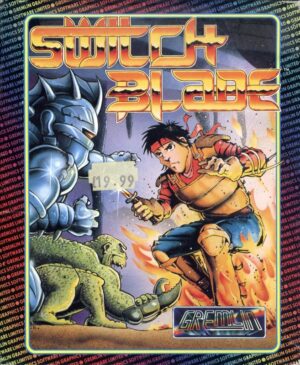Retro Replay Review
Gameplay
Quartet drops you into a series of alien-infested levels with a single clear objective: locate and defeat the end-of-level boss, claim the key it guards, and make your way to the exit. Each stage is laid out as a maze of platforms and hazards, requiring equal measures of strategy, timing, and firepower. As you explore, you’ll encounter waves of hostile inhabitants whose sole purpose is to block your progress. Their presence keeps the tension high throughout each mission and forces you to balance offense with careful navigation.
The star of the show is undoubtedly the jet-pack, which you must wrest from a well-guarded power-up station on every level. Once equipped, it grants you vertical mobility and a limited rocket boost, opening up shortcuts to secret platforms and exposing boss chambers from above. However, the jet-pack is fragile—in the moment you’re struck by an enemy blob, you lose your lift gear and plummet to the nearest safe ground. Regaining it becomes a mini-quest in itself, so you’ll quickly learn when to engage enemies and when to lay low to preserve your aerial advantage.
Enemies are more than cannon fodder. After being blown apart, each creature leaves behind collectible “parts” that add to your score tally, only to reconstitute moments later and resume their assault. This introduces an arcade-style risk-reward loop: do you clear out a cluster of foes for high points or bypass them entirely to chase after the boss key? Add to that the ever-present threat of respawning mobs and the careful resource management of your jet-pack and you have a gameplay loop that’s deceptively simple to understand but fiendishly difficult to master.
Graphics
Visually, Quartet embraces the classic pixel-art aesthetic of early console shooters, delivering bright, blocky sprites that stand out crisply against scrolling, multi-layered backgrounds. The color palette is bold without being garish—lush alien flora, industrial bases, and cavernous chambers each boast their own distinct hues, making it easy to tell which world you’re exploring. Subtle parallax scrolling on certain stages adds depth and enhances the sense of immersion into this hostile world.
Sprite animations are economical yet effective. Enemies twitch and reassemble with minimal frames, but their behavior is conveyed clearly: aggressive lunges, slow regeneration, and erratic flight patterns are instantly readable. The jet-pack flames flicker in a satisfying loop, offering just enough visual feedback to know exactly how much thrust you’re getting. Key pickups and score items shimmer with a post-render outline that guides your eye in fast-paced moments.
Although Quartet isn’t pushing polygon counts or real-time lighting, it nails the retro vibe with thoughtfully designed environments and crisp sprite scaling. Special effects—explosions, jet exhaust, and item flashes—are rendered with bright pixels that pop on-screen without causing slowdown. For fans of throwback platform shooters, the visuals capture the era’s charm while still feeling alive and punchy today.
Story
Quartet’s narrative isn’t delivered through cutscenes or extensive dialogue; it’s woven into the environments and level objectives. You’re an interstellar operative tasked with purging a colonial planet of hostile creatures and retrieving the boss’s key to secure each region. Details emerge through level naming conventions—the “Crimson Caverns,” “Mech Factory” and so on—hinting at a larger campaign to liberate multiple zones across the planet.
While minimal, the story’s structure gives purpose to every action: defeating bosses, preserving your jet-pack, and navigating branching platforms all feel meaningful when your ultimate goal is escape and progression. Collectible scraps left behind by foes suggest an ecosystem rebuilt from the technology you carry, reinforcing the notion that you’re truly up against a regenerating, living threat. The absence of lengthy exposition keeps momentum high, letting the setting speak for itself.
Story aficionados seeking deep lore might find Quartet’s narrative lightweight, but its approach works in service of immediate gameplay. By focusing on concise level goals and environmental storytelling, the game maintains a tight pace. You get just enough context to care about each stage’s unique dangers without wading through text dumps, making it well-suited for arcade-style sessions or quick pick-up-and-play bursts.
Overall Experience
Quartet delivers a blend of platform action and shoot-’em-up tension that feels both nostalgic and fresh. Its tight controls and clear objectives make for addictive runs, whether you’re aiming to clear the stage as fast as possible or to amass high scores by collecting every enemy part. The jet-pack mechanic raises the stakes, turning each encounter into a careful dance of attack and evasion.
Levels are crafted with multiple routes and hidden alcoves, encouraging exploration long after you’ve beaten the boss. Replayability is boosted by the score-chasing element and the emergent gameplay that arises when enemies respawn unpredictably. The balance of risk—losing your jet-pack or key upon contact—keeps you on edge, turning even familiar stages into fresh challenges on each playthrough.
If you’re drawn to retro-styled shooters with a side of platforming strategy, Quartet is a standout pick. It offers straightforward objectives wrapped in a deceptively deep gameplay loop, all presented with vibrant pixel art that evokes the golden age of console action. Whether you’re a veteran arcade hound or a newcomer seeking a crash course in old-school thrills, Quartet’s blend of speed, precision, and exploration makes for a compelling and lasting experience.
 Retro Replay Retro Replay gaming reviews, news, emulation, geek stuff and more!
Retro Replay Retro Replay gaming reviews, news, emulation, geek stuff and more!









Reviews
There are no reviews yet.